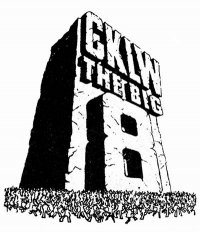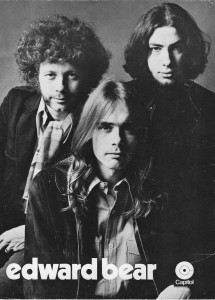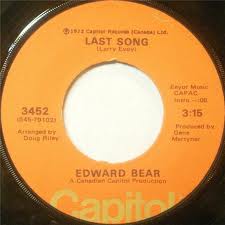ARTIST CLAIMS CKLW’S KEEN INTEREST AFFECTS U.S. HITS IN POPULARITY AND IN SALES
By RITCHIE YORKE
TORONTO — The future evolution of Canadian-made music in the U.S. charts depends very much on a “continuing keen interest” by the programmers of Radio CKLW Windsor/Detroit, according to Edward Bear’s singer/writer, Larry Evoy.
 Evoy credits CKLW with being “directly responsible” for the massive American success of his “Last Song” single on Capitol.
Evoy credits CKLW with being “directly responsible” for the massive American success of his “Last Song” single on Capitol.
Since the introduction of Canadian content regulations on AM broadcasters in this country (January 18, 1971), CKLW has been required to devote 30 percent of its playlist to records with at least a minimum involvement of Canadiana.
Its Canadian location notwithstanding, CKLW caters primarily to an audience in excess to 90 percent Americans. It has been the top-rating teen station in Detroit for several years and also draws strong ratings in nearby cities such as Cleveland and Toledo.
CKLW is the only Canadian-owned station (TV or radio) with a significant U.S. audience. In addition, CKLW is widely regarded as one of the key breakout stations for new recorded hits in the United States. A recent Billboard survey revealed that more hit singles are broken from Detroit than any other major market in the country.

It comes as no surprise then that CKLW has become the prime access route for Canadian record makers anxious to get their vinyl recorded wares onto the U.S. charts. In the early part of the Cancon era (acronym; Canadian context), CKLW demonstrated considerable reluctance in programming legitimately locally-made singles. Rather, the station searched out U.S. records with dubious Canadian connections (many a song written by Paul Anka, who left Canada fifteen-years ago, have found their way onto the ‘CK playlists) to avoid taking a chance on unknown Canadian artists.
But in the past six months or so, CKLW has gotten behind real Canadian records with unprecedented vengeance. At the same time, the station continues to make rating gains destroying the myth that CKLW could not fairly compete in Detroit with the Cancon millstone around its neck.
Edward Bear’s Larry Evoy is one of several key Canadian artists now singing the praises of the new ‘CK policy. “It seems that CKLW now listens to Canadian records seriously,” Evoy says. “They merely don’t dismiss them as inferior.”
Real Ear

Evoy believes that CKLW music director Rosalie Trombley has a real ear for picking unproven hits. He cites the example of Skylark’s current U.S. top 10 hit, “Wildflower” as an example of this ability.
“I must say also, that she was tremendously important in breaking ‘Last Song.’ If it hadn’t been for her efforts, I doubt if we’d done anywhere near as well,” he said.
“Last Song” had sold some 1,250,000 copies in the U.S. and in excess of 100,000 in Canada, making it the biggest-selling domestically produced pop record ever on home soil.
The follow-up single “Close Your Eyes” was at No. 44 with a star on the Hot 100 last week. It moved from No. 24 to No. 20 at CKLW with top five requests reported. “Last Song” had previously reached the No. 1 spot at CKLW, becoming the first Canadian-made single to ever achieve that difficult feat in a predominately R&B market.
Evoy said he favors the CRTC Cancon laws, which made a record industry in Canada a reality. “I cannot see that the regulations have caused any hardship anywhere.”
Evoy also considers Canadian studios to be the equal of U.S. recording facilities. “I’m very high on the studios here. We cut both of our U.S. hits at Thunder Sound in Toronto. As far as sound goes, you can get what you want — it just depends on what you’re doing and who you’re doing it with.” END.
(Information and news source: Billboard; May 26, 1973).
![]()
